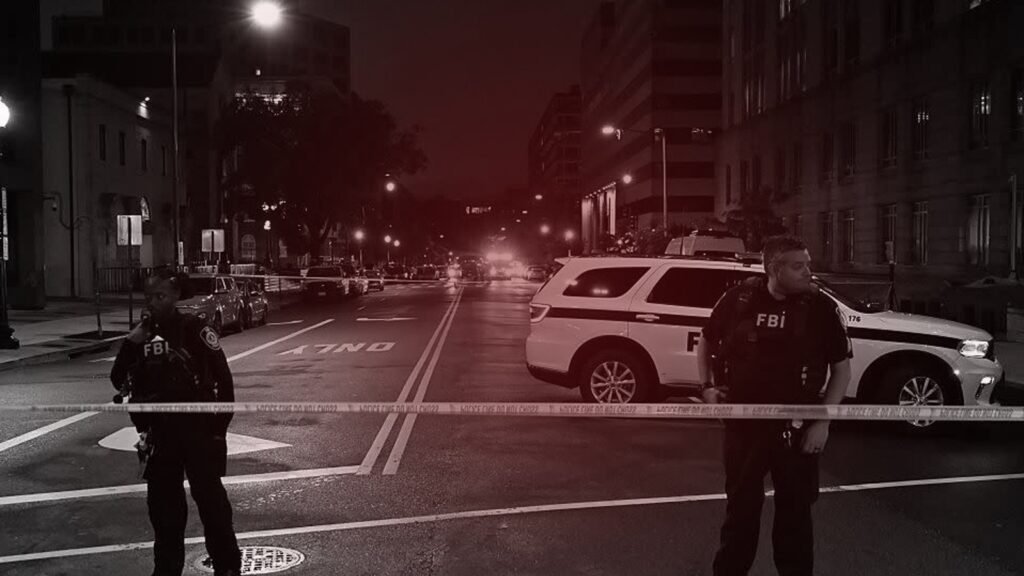In a nation already weathered by political divisions and global unrest, the United States was jolted Thursday by a chilling act of violence in its capital. Two staff members from the Israeli embassy were shot and killed in broad daylight outside the Capital Jewish Museum, just blocks from the heart of the U.S. federal government. Authorities quickly apprehended the suspect, who was heard shouting “Free Palestine” as he was tackled by police—a phrase that turned a deadly shooting into a flashpoint in an already polarized debate.
The victims, both embassy security officials, were reportedly on a routine visit to the museum when the gunman, later identified as 34-year-old Elias Rodriguez, opened fire with a semi-automatic weapon. Eyewitnesses described a terrifying scene as museum visitors and passersby ducked for cover. The attacker did not flee. Instead, he stood near the fallen bodies until police arrived, repeating the same political slogan as he was handcuffed and led away.
Initial reports suggest that Rodriguez had no known ties to organized extremist groups, but investigators are combing through his online activity and interviewing acquaintances to determine what may have driven him to commit what many officials are calling a hate crime. The FBI and Homeland Security have joined local law enforcement in the probe, given the diplomatic implications and fears of potential copycat acts.
President Trump, speaking from the White House lawn just hours after the incident, called the shooting a “despicable act of antisemitic terrorism” and pledged “an uncompromising federal response.” He added, “America stands with Israel and with the Jewish people here and around the world. This was not just an attack on two individuals—it was an attack on all of us.”
Israeli officials expressed deep sorrow and outrage. In a statement, the Israeli ambassador to the U.S. said the attack was “a brutal reminder that hatred knows no borders,” and emphasized the strong security cooperation between the two countries. The embassy has temporarily closed while security protocols are reviewed.
The shooting reverberated far beyond Washington. In Tel Aviv, flags were lowered to half-mast outside government buildings. In New York, extra police presence was deployed around Jewish institutions. Jewish organizations across the U.S. condemned the attack and renewed calls for increased protection of religious and cultural sites.
But the political dimensions of the shooting are also unfolding rapidly. Advocacy groups, lawmakers, and media outlets are divided over how to interpret the attack. Some frame it as a direct consequence of rising antisemitism, which has surged in the U.S. in recent years, especially amid heated discourse around the Israeli-Palestinian conflict. Others argue that while the motive appears to have a political element, individual mental health and radicalization dynamics must not be overlooked.
In Congress, the incident has added new urgency to bipartisan calls for a comprehensive domestic terrorism bill that addresses hate crimes against religious and ethnic groups. Senate Majority Leader Chuck Barlow said on the floor Thursday afternoon, “We must stop pretending that these are isolated incidents. The longer we delay, the more we risk.”
Meanwhile, Rodriguez remains in federal custody and is expected to face a long list of charges, including two counts of first-degree murder, hate crimes, and possibly terrorism-related offenses. His legal team has declined to comment, and his first court appearance is scheduled for early next week.
This tragedy unfolded against the backdrop of two other significant national stories: the passage of President Trump’s ambitious tax and spending bill and Bitcoin’s unprecedented climb past $110,000. Yet neither could overshadow the raw grief and fear sparked by gunshots in the capital. Outside the museum, flowers and candles began to pile up within hours. A small vigil was held in the evening, with attendees reciting prayers in Hebrew and English, some weeping quietly, others calling for justice through megaphones.
“This isn’t just a Jewish tragedy,” said Rabbi Eliana Horowitz, who led the vigil. “It’s an American one. Because if violence like this can happen in the shadow of our Capitol, with such naked hatred, then none of us are truly safe.”
The Capital Jewish Museum, a symbol of Jewish resilience and cultural history, had just launched an exhibition on Jewish-American contributions to diplomacy. The exhibit now stands eerily relevant and heartbreakingly ironic. The museum will remain closed until further notice.
For a city accustomed to political clashes, this was a different kind of rupture—one marked not by speeches or votes but by bullets and blood. Washington has seen tragedy before, but on this day, it carried an echo of something darker, something closer to the edge.


